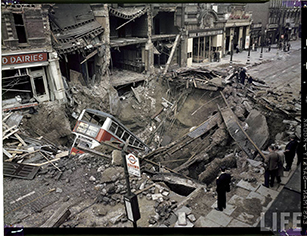![]()
![]()
![]()
Gabriele Frasca / Roberto Paci Dalò
Dylan Delay
[segue testo in italiano]
A music-theatre performance
after Dylan Thomas.
Written and performed by Gabriele Frasca & Roberto Paci Dalò.
The new stage work of Gabriel Frasca and Roberto Paci Dalò dedicated to the poet and radio author Dylan Thomas (1914-1953 ).
Throwing, mix, decompose , multiply , the voice of Dylan Thomas himself . The war , the radio , the bombings , the immediate post-war period (until the fateful 1954) live performances by Thomas evoke fragments of his radio play is feel in the original, in translation, in the form of registration shabby oratory, BBC recording studios , theaters off of postwar America , the villages Wales bombed with American college girls in heat, endless bars, Britten and Tippett, the son of Bartok (Thomas' record sound engineer) time where technologies meet those forty years after the war. guitar power as a link, the free-jazz ...
That after the war the popularity of Dylan Thomas grew rocketed in the UK first and then especially in the U.S , did not depend so by the alleged simplification of a poem that had over time established because of the power of the darkness haunts of his images , but the effect of dragging the popular ones that the poet himself would subsequently referred to as' his nitrites over the air.
"Dylan Thomas had in fact Meanwhile discovered what would become in just a little more powerful than its human instrument : the microphone. Of course the really far-sighted BBC played a central role for the entire production of the Welsh poet , who hosted voice since 1937 . But it was obviously during the period war ( when the issuer English , during the war of the waves , came to count up to 11,600 employees) that Thomas found himself in the BBC not only financial support but can also prove to be a writer busy on the home front. That collaboration would ultimately gave birth, in 1954, a few months after the death of poet, the radio drama universally acknowledged masterpiece of the genre: Under Milk Wood.
But the radio microphone was also used for other things: the first poet to take into his public readings (mostly American ) adequate amplification, Thomas would have been the first to go over the cage and throw the book at the American market a disc in his name.
.
Il nuovo lavoro scenico di Gabriele Frasca e Roberto Paci Dalò dedicato al poeta e autore radiofonico Dylan Thomas (1914 – 1953).
Lanciare, mixare, scomporre, moltiplicare, la voce dello stesso Dylan Thomas. La guerra, la radio, i bombardamenti, l'immediato dopoguerra (fino al fatidico 1954), le performance dal vivo di Thomas da evocare, frammenti del suo radiodramma si sentono in originale, in traduzione, in registrazione malandata della forma oratorio, studi di registrazione della BBC, teatrini off dell'America postbellica, paesini del Galles bombardati, college americani con ragazzine in calore, bar e pub a strafottere, Britten e Tippett, il figlio di Bartòk (tecnico del suono del disco di Thomas), tempo in cui le tecnologie degli anni quaranta incontrano quelle del dopoguerra. chitarra elettrica come raccordo, il free-jazz...
Che nell’immediato dopoguerra la popolarità di Dylan Thomas crescesse
vertiginosamente, in Gran Bretagna prima e poi soprattutto negli USA, non dipese tanto dalla presunta semplificazione di una poesia che si era nel corso del tempo affermata proprio per la potenza perseguita dall’oscurità delle sue immagini, ma dall’effetto di trascinamento popolare di quelli che lo stesso poeta avrebbe successivamente definito «i suoi nitriti via etere». Dylan Thomas aveva difatti nel frattempo scoperto quello che sarebbe divenuto nel giro di poco il suo più potente strumento umano: il microfono.
Certo la lungimirante BBC svolse per davvero un ruolo centrale nell’intera produzione del poeta gallese, che ospitò in voce già dal 1937. Ma fu ovviamente durante il periodo bellico (quando l’emittente inglese, in piena guerra delle onde, arrivò a contare fino a 11.600 addetti) che Thomas trovò nella BBC non solo un sostegno economico ma anche la possibilità di dimostrare di essere uno scrittore impegnato sul fronte interno.
Quella collaborazione avrebbe infine dato vita, nel 1954, a pochi mesi dalla morte del poeta, al radiodramma universalmente riconosciuto il capolavoro del genere: Under Milk Wood.
Ma quel microfono della radio servì anche ad altro: primo poeta a richiedere nelle sue letture pubbliche (per lo più americane) un’amplificazione adeguata, Thomas sarebbe stato anche il primo ad andare oltre la gabbia del libro e a lanciare sul mercato (americano) un disco a suo nome.
.
Gabriele Frasca è nato a Napoli nel 1957. Insegna Letterature comparate e Media comparati all’Università di Salerno. Per Einaudi ha curato numerose edizioni delle opere di Samuel Beckett e ha pubblicato tre raccolte di poesie: Lime (1995), Rive (2001) e Rimi (2013). Il suo ultimo romanzo, Dai cancelli d’acciaio, è apparso nel 2011 presso Luca Sossella. Ha collaborato a più riprese con RadioRai e dal 2012 è presidente del Premio Napoli.
gabrielefrasca.it
Roberto Paci Dalò. Regista, compositore / musicista e artista visivo è il direttore artistico del gruppo Giardini Pensili e dello spazio Velvet
Factory (Rimini). Le sue opere sono state presentate in Europa, Asia, Africa, Americhe, Russia, Medio Oriente e Israele nei principali teatri, festival e musei.
robertopacidalo.com
Paci Dalò's investigation throughout war time, Fascism, Nazism, and Jewish culture across the 30s and 40s, is documented in previous works such as Italia anno zero (Budapest, Vienna, Strasbourg, Huddersfield, Berlin 2004), Schwarzes Licht (Berlin 2004), Greuelmärchen (Berlin 2006), De bello Gallico (Rimini 2011), Ye Shanghai (Shanghai 2012).

